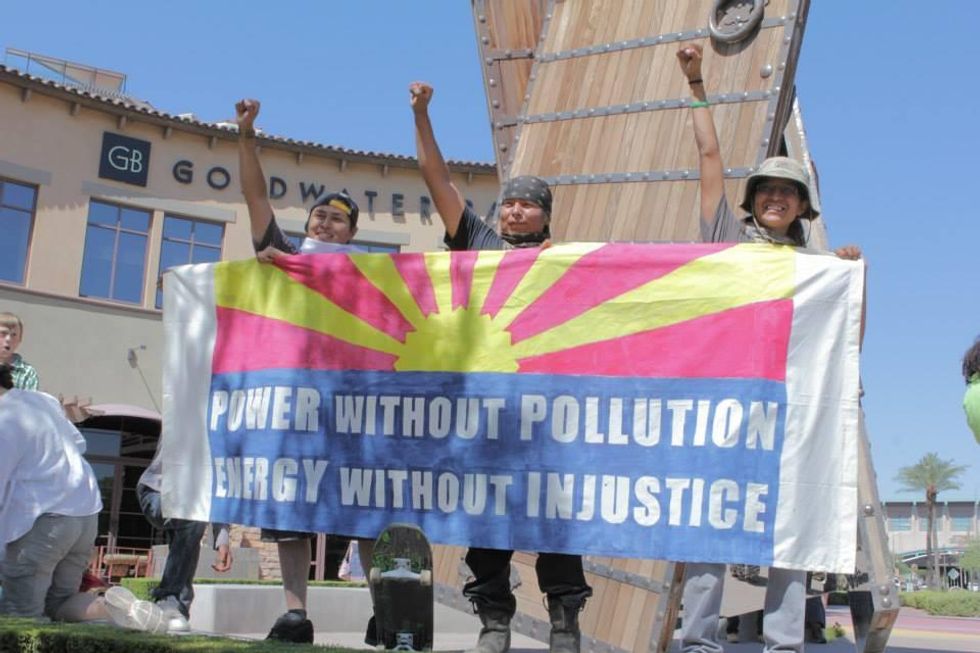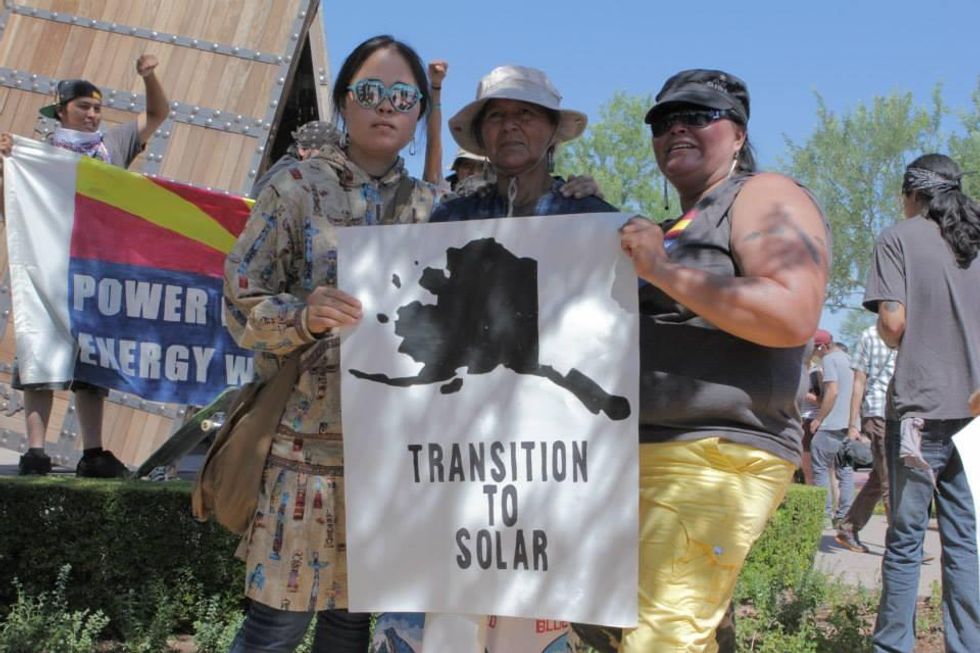Jun 19, 2013

After a winding march, approximately 60 demonstrators used a massive solar-powered truck to pump water from the critical Central Arizona Project (CAP) canal into barrels for delivery to the reservation.
Flanked by supporters from across the United States, tribe members created a living example of what a Navajo-led transition away from coal toward solar power in the region could look like.
Participants waved colorful banners and signs declaring 'Power Without Pollution, Energy Without Injustice'.
"We were a small group moving a small amount of water with solar today," declared Wahleah Johns with Black Mesa Water Coalition. "However if the political will power of the Obama Administration and SRP were to follow and transition NGS to solar all Arizonans could have reliable water and power without pollution and without injustice."
The demonstration was not only symbolic: the reservation needs the water they were collecting.
While this Navajo community lives in the shadow of the Navajo Generating Station--the largest coal-powered plant in the Western United States--many on the reservation do not have running water and electricity themselves and are forced to make the drive to the canal to gather water for cooking and cleaning.
This is despite the fact that the plant--owned by Salt River Project and the U.S. Department of Interior--pumps electricity throughout Arizona, Nevada, and California.
Yet, the reservation does get one thing from the plant: pollution.
The plant is "one of the largest sources of harmful nitrogen oxide (NOx) emissions in the country," according to the Environmental Protection Agency.
While plant profiteers argue it brings jobs to the area, plant workers describe harrowing work conditions. "We are the sweatshop workers for the state of AZ, declared Navajo tribe member Marshall Johnson. "We are the mine workers, and we are the ones that must work even harder so the rest don't have to."
These problems are not limited to this Navajo community. Krystal Two Bulls from Lame Deer, Missouri--who came to Arizona to participate in the action--explained, "We're also fighting coal extraction that is right next to our reservation, which is directly depleting our water source."
The action marked the kickoff to the national Our Power Campaign, under the banner of Climate Justice Alliance, that unites almost 40 U.S.-based organizations rooted in Indigenous, African American, Latino, Asian Pacific Islander, and working-class white communities to fight for a transition to just, climate-friendly economies.

_____________________
Why Your Ongoing Support Is Essential
Donald Trump’s attacks on democracy, justice, and a free press are escalating — putting everything we stand for at risk. We believe a better world is possible, but we can’t get there without your support. Common Dreams stands apart. We answer only to you — our readers, activists, and changemakers — not to billionaires or corporations. Our independence allows us to cover the vital stories that others won’t, spotlighting movements for peace, equality, and human rights. Right now, our work faces unprecedented challenges. Misinformation is spreading, journalists are under attack, and financial pressures are mounting. As a reader-supported, nonprofit newsroom, your support is crucial to keep this journalism alive. Whatever you can give — $10, $25, or $100 — helps us stay strong and responsive when the world needs us most. Together, we’ll continue to build the independent, courageous journalism our movement relies on. Thank you for being part of this community. |
Our work is licensed under Creative Commons (CC BY-NC-ND 3.0). Feel free to republish and share widely.
Sarah Lazare
Sarah Lazare was a staff writer for Common Dreams from 2013-2016. She is currently web editor and reporter for In These Times.

After a winding march, approximately 60 demonstrators used a massive solar-powered truck to pump water from the critical Central Arizona Project (CAP) canal into barrels for delivery to the reservation.
Flanked by supporters from across the United States, tribe members created a living example of what a Navajo-led transition away from coal toward solar power in the region could look like.
Participants waved colorful banners and signs declaring 'Power Without Pollution, Energy Without Injustice'.
"We were a small group moving a small amount of water with solar today," declared Wahleah Johns with Black Mesa Water Coalition. "However if the political will power of the Obama Administration and SRP were to follow and transition NGS to solar all Arizonans could have reliable water and power without pollution and without injustice."
The demonstration was not only symbolic: the reservation needs the water they were collecting.
While this Navajo community lives in the shadow of the Navajo Generating Station--the largest coal-powered plant in the Western United States--many on the reservation do not have running water and electricity themselves and are forced to make the drive to the canal to gather water for cooking and cleaning.
This is despite the fact that the plant--owned by Salt River Project and the U.S. Department of Interior--pumps electricity throughout Arizona, Nevada, and California.
Yet, the reservation does get one thing from the plant: pollution.
The plant is "one of the largest sources of harmful nitrogen oxide (NOx) emissions in the country," according to the Environmental Protection Agency.
While plant profiteers argue it brings jobs to the area, plant workers describe harrowing work conditions. "We are the sweatshop workers for the state of AZ, declared Navajo tribe member Marshall Johnson. "We are the mine workers, and we are the ones that must work even harder so the rest don't have to."
These problems are not limited to this Navajo community. Krystal Two Bulls from Lame Deer, Missouri--who came to Arizona to participate in the action--explained, "We're also fighting coal extraction that is right next to our reservation, which is directly depleting our water source."
The action marked the kickoff to the national Our Power Campaign, under the banner of Climate Justice Alliance, that unites almost 40 U.S.-based organizations rooted in Indigenous, African American, Latino, Asian Pacific Islander, and working-class white communities to fight for a transition to just, climate-friendly economies.

_____________________
Sarah Lazare
Sarah Lazare was a staff writer for Common Dreams from 2013-2016. She is currently web editor and reporter for In These Times.

After a winding march, approximately 60 demonstrators used a massive solar-powered truck to pump water from the critical Central Arizona Project (CAP) canal into barrels for delivery to the reservation.
Flanked by supporters from across the United States, tribe members created a living example of what a Navajo-led transition away from coal toward solar power in the region could look like.
Participants waved colorful banners and signs declaring 'Power Without Pollution, Energy Without Injustice'.
"We were a small group moving a small amount of water with solar today," declared Wahleah Johns with Black Mesa Water Coalition. "However if the political will power of the Obama Administration and SRP were to follow and transition NGS to solar all Arizonans could have reliable water and power without pollution and without injustice."
The demonstration was not only symbolic: the reservation needs the water they were collecting.
While this Navajo community lives in the shadow of the Navajo Generating Station--the largest coal-powered plant in the Western United States--many on the reservation do not have running water and electricity themselves and are forced to make the drive to the canal to gather water for cooking and cleaning.
This is despite the fact that the plant--owned by Salt River Project and the U.S. Department of Interior--pumps electricity throughout Arizona, Nevada, and California.
Yet, the reservation does get one thing from the plant: pollution.
The plant is "one of the largest sources of harmful nitrogen oxide (NOx) emissions in the country," according to the Environmental Protection Agency.
While plant profiteers argue it brings jobs to the area, plant workers describe harrowing work conditions. "We are the sweatshop workers for the state of AZ, declared Navajo tribe member Marshall Johnson. "We are the mine workers, and we are the ones that must work even harder so the rest don't have to."
These problems are not limited to this Navajo community. Krystal Two Bulls from Lame Deer, Missouri--who came to Arizona to participate in the action--explained, "We're also fighting coal extraction that is right next to our reservation, which is directly depleting our water source."
The action marked the kickoff to the national Our Power Campaign, under the banner of Climate Justice Alliance, that unites almost 40 U.S.-based organizations rooted in Indigenous, African American, Latino, Asian Pacific Islander, and working-class white communities to fight for a transition to just, climate-friendly economies.

_____________________
We've had enough. The 1% own and operate the corporate media. They are doing everything they can to defend the status quo, squash dissent and protect the wealthy and the powerful. The Common Dreams media model is different. We cover the news that matters to the 99%. Our mission? To inform. To inspire. To ignite change for the common good. How? Nonprofit. Independent. Reader-supported. Free to read. Free to republish. Free to share. With no advertising. No paywalls. No selling of your data. Thousands of small donations fund our newsroom and allow us to continue publishing. Can you chip in? We can't do it without you. Thank you.